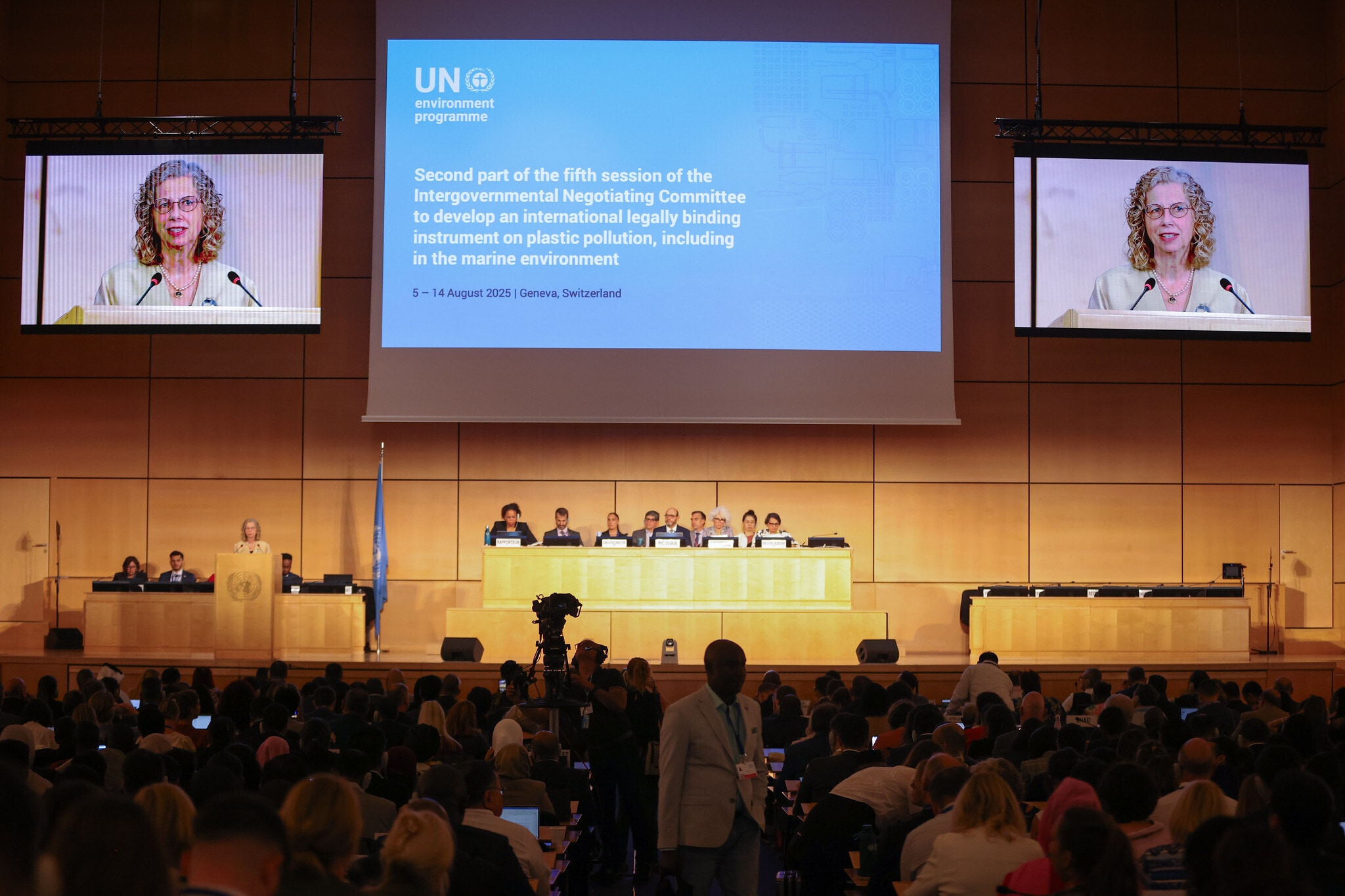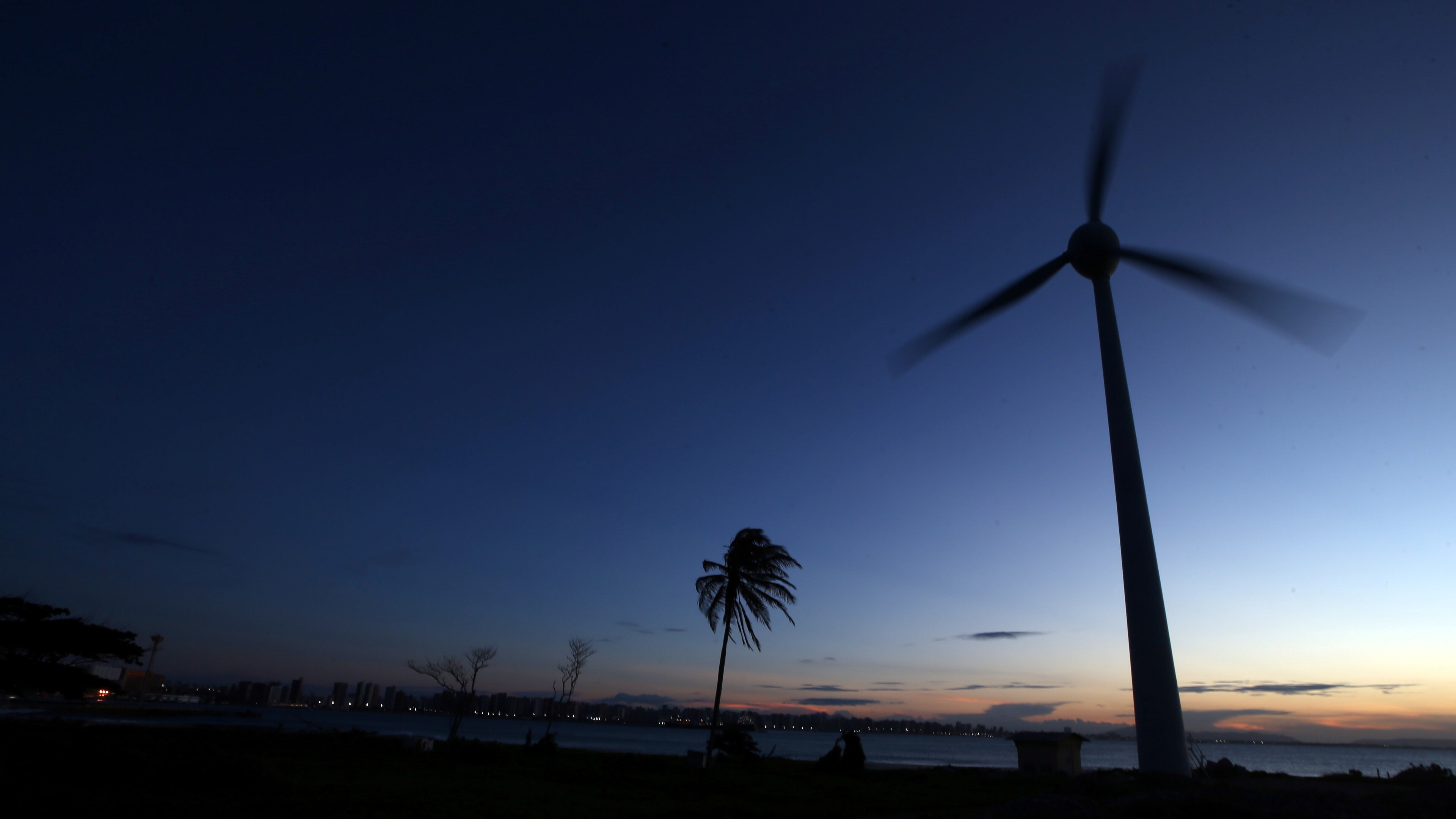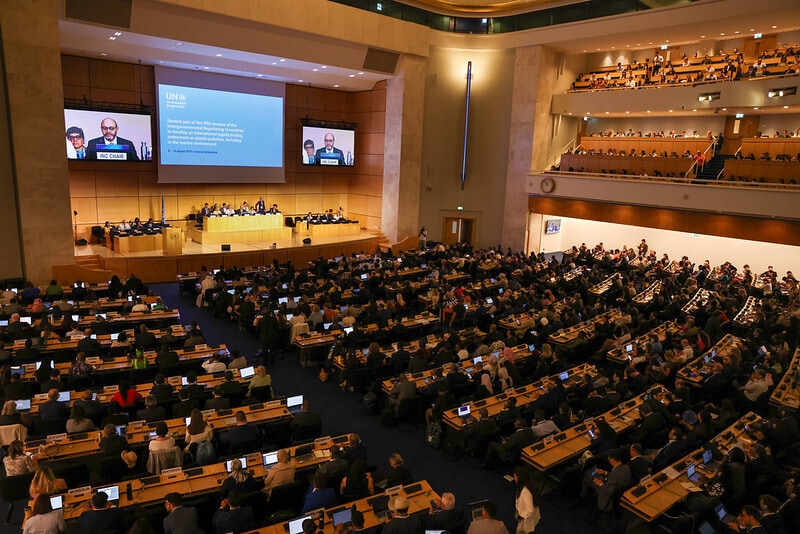COP26: Success or failure? A climate correspondent's verdict
TIME's climate correspondent Justin Worland on whether COP26 was a success or a failure.
Image: World Economic Forum / Valeriano Di Domenico
Stay up to date:
Road to COP26
Accept our marketing cookies to access this content.
These cookies are currently disabled in your browser.
- Was COP26 a success or failure? We ask TIME's climate correspondent.
- Justin Worland covered the twists and turns of the Glasgow climate summit.
- COP26 president says 1.5 C warming target still within reach 'but its pulse is weak'.
The 26th Conference of the Parties to the UN Climate Change Convention lasted for two weeks. It resulted in the 'Glasgow Climate Pact' agreed by consensus of all delegations from around the world.
But did that text, plus the many agreements forged on the sidelines of the summit, mean the world is now closer to averting climate catastrophe.
Radio Davos spoke to a reporter who was covering the event, TIME's Justin Worland. We started by asking him about the last-minute change to the Climate Pact - pushed through by India and China - that weakened a reference to phasing out coal to make it 'phasing down'. It produced a moment of high drama at the summit's closing session, but how significant was it?
Accept our marketing cookies to access this content.
These cookies are currently disabled in your browser.
(This is an edited Q&A from the Radio Davos interview which you can hear in full here)
Naming the unmentionable?
Justin Worland: There were a number of ways this represented a key moment. The Swiss delegation asked a key process question: why at the last minute did India have the ability to shape the text when others weren't allowed to? And I think that fits into a bigger critique about who really had power and authority to shape this conversation - and that was the big countries, the big players. And then, of course, this is the central question of this year and this COP in some ways - consigning coal to history, getting rid of this really polluting fossil fuel. And so we got to the moment where it seemed like the language was going to be very strong about 'phasing out', and it ended up being about 'phasing down'. It sort of reflects the bigger conversation around this COP, which is that it moved the ball forward, but it didn't move it far enough forward. I think that's what a lot of people would say.
Robin Pomeroy: Activist groups such as Greenpeace obviously were disappointed at this. A lot of people, on the whole, were disappointed by it. However, Jennifer Morgan of Greenpeace has said this is a landmark because coal was mentioned by name. Perhaps that will be seen as one of the landmark moments in Glasgow?
Accept our marketing cookies to access this content.
These cookies are currently disabled in your browser.
Justin Worland: Absolutely. It's pretty remarkable when you think about the role that fossil fuels play in causing climate change and the fact that under this COP process, fossil fuels have never before been named directly. And so to name them, to say explicitly, that we need to phase down unabated coal and phase out inefficient fossil fuel subsidies, that's a pretty big deal.
A lot of times people say, 'It's just a bunch of talk'. But, I look back to the Paris talks and the role that some small vulnerable countries had in putting in 1.5 degrees Celsius as the target for emissions reduction when previously the conversation had been around 2 degrees - that totally changed things. You couldn't have known it at the time, but six years later that push totally changed the conversation. And so, I think this mention of fossil fuels could have implications that maybe aren't clear at the moment.
Numbers game
Robin Pomeroy: The 1.5 target is to limit the warming of average global temperatures to 1.5 degrees Celsius warmer than they were in pre-industrial times. We're already at 1.1. Anything above 1.5 is going to cause some pretty disastrous impacts. Do you have a sense of where Glasgow will bring us - how close to the 1.5 target?
Justin Worland: There are a number of different numbers, but in the middle of COP26, Climate Action Tracker, a group that produces research and modelling, found that with current policies that are underway or enroute to being implemented, we're at about 2.7 degrees of warming - way over that 1.5-degree level. Then if you look at commitments for 2030, you can bring that number down to 2.4 - so it's closer, but still far off. And then if you look at the long-term commitments and sort of extrapolate, that number comes down to 1.8. But there's a huge gap between the policies that are actually being implemented and the promises which don't have any sort of real detail. And so, where are we between 1.8 and 2.7? I think, realistically, closer to 2.7, but it's hard to know exactly.
Robin Pomeroy: This is what Alok Sharma, the chairman of the meeting, said in the closing session:
'I think today, we can say with credibility that we have kept 1.5 degrees within reach, but its pulse is weak.'
Let's move on from coal and to another key element of what was agreed in that Glasgow Pact: carbon trading rules. On emissions trading rules, did Glasgow deliver?
Justin Worland: The big thing I would flag would be the 'double counting', which establishes a system that prevents credit counting in the place where it was created, where the offset and sucking of carbon out of the atmosphere were actually happening, and also the countries that buy it. This was one big concern. They managed to thread a needle and allow countries to essentially determine whether that offset was going to count there or in the place that buys it. So that was one big compromise. There was a compromise on carrying over some of those credits that existed before this regime. There were a lot of compromises that the environmental and business communities that really care were satisfied with.
COP26 to COP27
Robin Pomeroy: Another element of Glasgow is that they're going to do it all again next year. Perhaps not all again, but the countries are going to be coming back with improved emissions pledges. What does that mean? Because these COPs do happen every year. So why is that different from what COP27 would have been?
Justin Worland: These COPs happen every year, but they tended to exist on a cycle where you get a big COP every five years - a Copenhagen, Paris or a Glasgow. This is according to the Paris Agreement language around coming back every five years with new and improved commitments that will improve a country's standing on emissions reduction. What they said in Glasgow is: 'Actually, we are totally behind this year. We can't wait another five years. We have to come back next year with improved commitments.'
So countries have to come back and say, 'these are the additional things we can do for 2030,' to cut emissions. I think there's a big question, at least in my mind, about whether they will actually follow through. We've already seen Australia say, 'Actually, this doesn't really apply to us. We're doing enough'. So, can they actually keep up the momentum to make that happen next year? We'll see. But at least it's framed to make the COP in Egypt next year another big moment where countries will actually bring concrete policies to the table.
Accept our marketing cookies to access this content.
These cookies are currently disabled in your browser.
Adaptation and Compensation
Robin Pomeroy: We've mentioned coal, fossil fuels, and emissions trading. We've mentioned coming back next year to increase emissions pledges. Are there any other major parts of the COP26 Glasgow Pact?
Justin Worland: One thing I would flag is the concerns of the vulnerable countries. These countries tried to get strong language around 'loss and damage', which is the idea that they are going to experience the worst effects and they should be compensated in some way for that loss and damage. And they tried to get really strong language. This is something that developed countries tried to avoid dealing with - in the way that the vulnerable counterparts wanted them to, in large part because it opens the door to liability. There was reference to continuing that dialogue. But I think that's an area to watch because these countries are not going to let it go.
The other thing I would reference was the mention of adaptation and finding a way to really gear up finance for adaptation measures in developing countries. In 2009, developed countries committed to providing $100 billion a year beginning in 2020 until 2025 in climate finance for developing countries. Fifty percent of that was supposed to go to adaptation. That hasn't been met and so these countries are looking for ways to really gear that up, and there's language around creating post-2025 adaptation finance. This is really more robust than what we've seen thus far.
Robin Pomeroy: Beyond the Glasgow pact itself, there were other agreements that happened on the sidelines. Did any stand out to you as being particularly significant?
Game changers?
Justin Worland: On the bilateral agreement side at COP26, I would cite the US-China agreement. There are two key details in there: China agreeing to work on methane and creating a dialogue for emissions reductions in the 2020s. These are important details. But I think the main thing is that here are the two biggest emitters, and the two biggest economies, which have been in conflict for the last several years, saying: 'We're going to work together on this issue'. We're going to put aside our differences for the good of addressing climate change. And I think that that was a really important moment. If they can follow through on that, that will be significant.
There are so many things that could also be mentioned, for instance, the agreement on ending deforestation - pretty toothless, but it had more than 100 countries sign up to it. An agreement on reducing methane emissions globally by 30% between 2020 and 2030. More than 100 countries signed up to that.
GFANZ - the Glasgow Financial Alliance for Net Zero committed to finding ways to get to net zero. And of course, the First Movers Coalition came out of a partnership between the World Economic Forum and the US State Department to galvanize clean energy technology by getting companies to commit to buying it and thereby creating that demand signal.
COP26: 'blah, blah, blah'?
Robin Pomeroy: Which does suggest then that a massive conference like COP26 - one of the biggest United Nations meetings ever held - is not just all blah blah. Maybe there is some point in these things.
Accept our marketing cookies to access this content.
These cookies are currently disabled in your browser.
Justin Worland: I understand the sentiment behind 'blah, blah, blah'. I also think that these conferences serve a purpose. I think the important thing is to have some sort of accountability. It's great that countries are committed to coming back next year - we need to hold their feet to the fire to make sure they do it. It's great that these financial institutions committed to net zero and financing the transition - let's make sure they do. These conferences totally have a point, in my mind. It's incumbent upon media and activists to do the work to ensure that the follow-through happens. So, yeah, I don't think it's blah, blah, blah.
Robin Pomeroy: On a wider level, what should happen now and in future to change the game and actually achieve what needs to be achieved on climate change?
Justin Worland: It'll be interesting to see if countries have followed through during next year's COP. There is renewed confidence in multilateral engagement from this sort of altruistic 'we all have to be in this together' approach, and the thinking around ways in which countries might use trade and other sorts of financial incentives to really press others. This includes initiatives like the European Commission's Carbon Border Adjustment Mechanism (CBAM), which creates a border levy on products in a certain subset of high-carbon industries. So if you're importing a product from a place that is really bad on emissions, it's going to face a penalty. Europe is rolling this out and there is a nascent discussion about it in the United States. We've also heard ministerial-level comments about it in the United Kingdom. So it's a potentially game-changing discussion.
Robin Pomeroy: There will be a meeting of the World Trade Organisation (WTO) in a few weeks time here in Geneva, and it's going to be interesting to see how levies like that come up against global trade rules, which are handled by the WTO. We've done an episode on the potential conflicts there.
Accept our marketing cookies to access this content.
These cookies are currently disabled in your browser.
Justin Worland: You know, when I asked this question to Dr. Ngozi Okonjo-Iweala, who is the head of the WTO, her response was: 'If they're well well-structured, I don't see any reason why this wouldn't withstand WTO scrutiny'. And that seems to be the broad read of the trade lawyers. But that's a big if, right?
Accept our marketing cookies to access this content.
These cookies are currently disabled in your browser.
COP26: success or failure?
Robin Pomeroy: In a word, then success or failure for COP26?
Justin Worland: Well, I hate to break the one-word thing. It's nuance, right? It's both. I asked a similar question to Achim Steiner, the head of the United Nations Development Programme, and he said something along the lines of: 'When we're in such a dire situation, COPs can never really be a success'. I would echo that and say it moved the ball forward, but the situation is dire, so we need to do more.
Accept our marketing cookies to access this content.
These cookies are currently disabled in your browser.
All our COP26 podcasts are here.
And find all our podcasts here.
Subscribe: Radio Davos; Meet the Leader; Agenda Dialogues.
Join the World Economic Forum Podcast Club on Facebook.
Don't miss any update on this topic
Create a free account and access your personalized content collection with our latest publications and analyses.
License and Republishing
World Economic Forum articles may be republished in accordance with the Creative Commons Attribution-NonCommercial-NoDerivatives 4.0 International Public License, and in accordance with our Terms of Use.
The views expressed in this article are those of the author alone and not the World Economic Forum.
Forum Stories newsletter
Bringing you weekly curated insights and analysis on the global issues that matter.
More on Climate ActionSee all
Tom Crowfoot
August 20, 2025
Charlotte Edmond and Rebecca Geldard
August 19, 2025
Yufang Jia and William Jernigan
August 18, 2025
Jürgen Karl Zattler and Adrian Severin Schmieg
August 18, 2025
Piyush Verma
August 18, 2025
Andrea Willige
August 15, 2025





